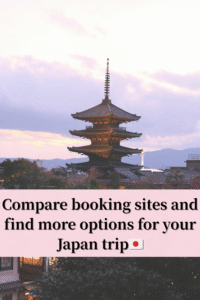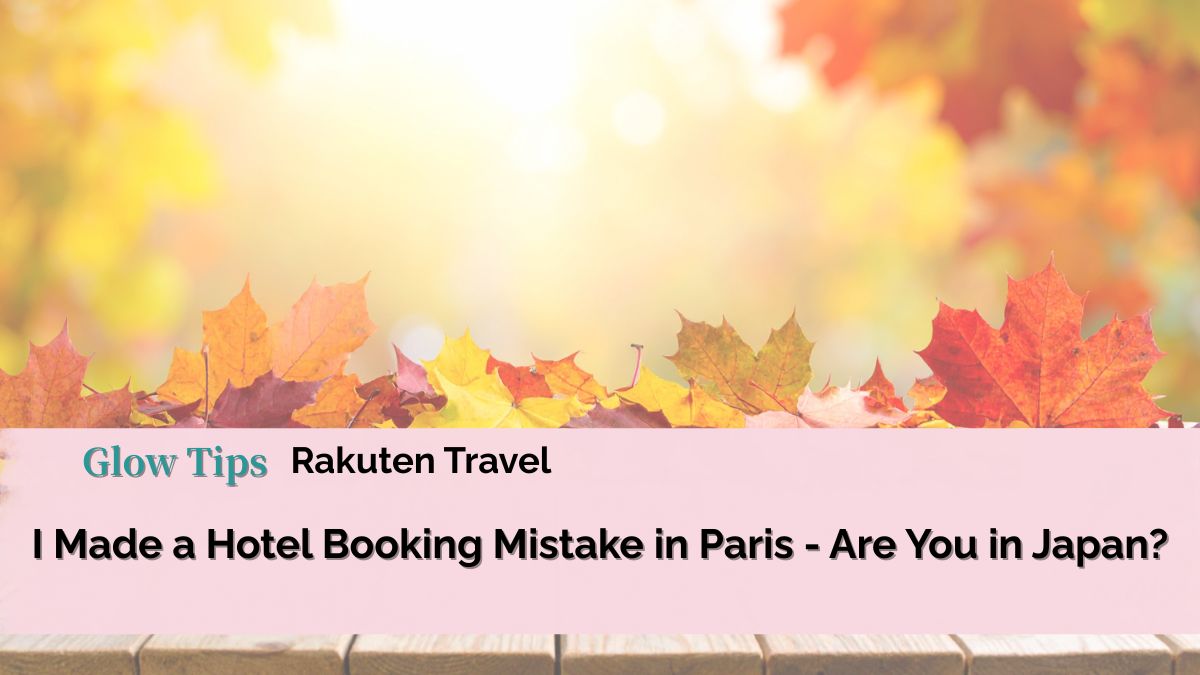- Introduction: My Paris Regret
- The Pattern I Noticed
- The Realization: What About Japan?
- What I Researched: Rakuten Travel
- What Makes It Different
- The Two-Site Comparison I Wish I’d Done
- When Rakuten Travel Makes Sense
- Common Questions I Had (And You Might Too)
- How to Use It
- Why I’m Comfortable Recommending This
- Things to Consider
- My Approach Now
- Final Thoughts
- Disclosure
- References
- About the Author
Introduction: My Paris Regret
When I traveled to Paris, I booked my hotel through a travel package.
It was convenient. It was easy. I didn’t think twice about it.
But on the night I checked in, I had a thought.
“Would someone who actually lives in Paris use this hotel?”
After I returned home, I got curious and looked it up.
I found hotels in the same area with better reviews. And they were slightly cheaper.
When I checked the booking sites that locals in France use, I saw completely different options.
“I missed out on so many choices just because I didn’t know.”
That regret stayed with me.
Imagine this.
You’re searching for hotels in Kyoto.
Agoda says: “Sold out.”
You close the tab. You look for another area.
But what if…
Another site still had rooms?
The same ryokan. Available. Waiting.
You just didn’t know to check.
That’s exactly what happened to me in Paris.
And I don’t want you to feel that regret after your Japan trip.
The Pattern I Noticed
The same thing happened in Singapore.
Travel packages are easy. But the options are limited.
Global OTAs (Expedia, Booking.com, etc.) are convenient. But they focus on tourist-oriented properties.
The sites that locals actually use are different.
And I kept booking without knowing that.
Every time, after I got home, I’d think “maybe there were better options.”
But by then, it was too late.
The Realization: What About Japan?
Living in Tokyo, I had a realization.
“Are travelers coming to Japan making the same mistake I made?”
Maybe someone is repeating the same regret I had in Paris.
For example:
- Agoda and Booking.com are the standard choices
- But the sites Japanese people actually use are different
- Without knowing it, they’re missing out on options
Just like I wished I’d known about “the local site” when traveling abroad, people coming to Japan might feel the same way.
Ready to explore Japan? Let’s talk about finding hotels the way locals do.
What I Researched: Rakuten Travel
I looked into it.
What hotel booking site do Japanese people actually use?
Rakuten Travel.
According to Rakuten Travel’s official information:
- One of Japan’s largest OTAs (over 34,000 accommodations)
- Part of Rakuten Group (over 1.6 billion members)
- English version available (travel.rakuten.com)
- Available in 9 languages
This was the Japanese version of “the local site” I wished I’d known about before booking Paris.
Japanese people actually use it.
That’s why it has different inventory, different options than global OTAs.
What Makes It Different
Global OTA vs Local-Focused OTA
What’s the difference? Here’s what I learned.
Different Inventory
Based on travel forum discussions I researched:
Even when Agoda and Booking.com show “sold out,” Rakuten Travel may still have availability.
Why?
Because each OTA gets a different allocation of rooms from hotels.
As one of Japan’s largest OTAs, Rakuten Travel may secure more inventory.
This is especially powerful during peak seasons (cherry blossoms, autumn leaves, year-end holidays, etc.).
Different Listings
Small-scale ryokans and regional inns are sometimes listed only on Rakuten Travel.
Global OTAs tend to focus on major hotel chains and business hotels.
But because it’s Japan-focused, even small family-run ryokans are included.
Just like I wanted to find “the small hotels where locals stay” when traveling abroad, those options exist in Japan too.
Different Plan Details
This is significant.
On Rakuten Travel, you can see detailed information about meal plans (breakfast, dinner, kaiseki cuisine, etc.).
Plans that just say “Breakfast included” on Agoda/Booking.com show more detail on Rakuten:
- What kind of breakfast (Japanese/Western/buffet)
- Dinner content (kaiseki cuisine, local ingredients, seasonal menu)
- In-room dining or restaurant
This detailed information matters when booking ryokans.
Japanese Reviews
Based on actual review pages on travel.rakuten.com:
Rakuten Travel has reviews written in Japanese.
Each review has a “Translate” button so you can read them in English.
You can see the local perspective.
Quality of hot springs, food ratings, staff service.
Not just tourist perspective, but what locals think.
The information I wanted before booking is here.
The Two-Site Comparison I Wish I’d Done
What I should have done when booking my Paris trip:
- Search on Expedia
- + Also search on French local sites
- 5-minute comparison
- More options to choose from
But I didn’t.
I didn’t even know local sites existed.
I was satisfied with what I found on Expedia and just booked it.
Result: regret after returning home.
When planning a Japan trip (at the booking stage):
- Search on Agoda
- + Also search on Rakuten Travel
- 5-minute comparison
- More options to choose from
Just 5 minutes.
Before you book.
But it changes what options you can see.
Hotels you thought were sold out might actually be available.
You might discover small ryokans you didn’t know existed.
5 minutes before booking can change the quality of your trip.
When Rakuten Travel Makes Sense
Before I researched this, I wanted to know:
- ✅ Alternative options when global OTAs show “sold out”
- ✅ Small-scale, locally-focused accommodations
- ✅ Reviews from locals
- ✅ Detailed accommodation plan information
If You Want More Than Just “A Place to Sleep”
- ✅ Discover hidden gems
Small ryokans where locals actually stay - ✅ Make your trip more authentic
See options through a Japanese lens, not just tourist lens - ✅ Expand your choices
34,000+ properties means more possibilities - ✅ Experience traditional omotenashi
Japan Quality certified accommodations with authentic hospitality
If You Want to Avoid Common Booking Regrets
- ✅ Don’t settle for “sold out”
Check one more site before giving up - ✅ Don’t miss local favorites
Avoid the “I wish I’d known” feeling I had in Paris - ✅ Don’t overpay without comparing
5 minutes of comparison can reveal better deals - ✅ Don’t book blindly during peak season
When cherry blossom season hits, having backup options matters
Whether you’re looking for “something special” or trying to avoid “missing out,” checking both sites gives you better choices.
What You Get with Rakuten Travel
✅ Inventory when Agoda shows “sold out”
Based on forum discussions, travelers have found availability on Rakuten Travel when other sites showed “sold out.”
✅ Small ryokans (not listed on Agoda)
Family-run ryokans and small inns that focus on the Japanese market.
✅ Japanese reviews (with translation)
Japanese reviews with “Translate” button for each review.
✅ Detailed meal plan information
Clear descriptions of kaiseki meals, seasonal ingredients, and dining arrangements.
✅ Japan Quality certification
Rakuten Travel Award and Japan Quality badges indicate accommodations that embody traditional omotenashi hospitality.
✅ Super Sales
According to official information, Rakuten Travel holds Super Sales three times a year with discounts up to 70%.
Common Questions I Had (And You Might Too)
Before I tried this two-site comparison, I had some doubts.
You might be thinking the same things.
“Isn’t this too much work?”
That’s what I thought too.
But here’s the reality:
- Step 1 (Agoda search): 2 minutes
- Step 2 (Rakuten search): 3 minutes
- Total: 5 minutes
5 minutes before a trip that you’ve been planning for months.
When I think about the hours I spent researching restaurants and attractions, 5 minutes for accommodation seems… reasonable.
“Won’t the prices be the same anyway?”
Not always.
Based on forum discussions I researched:
- Some users found lower prices on Rakuten Travel
- Some found better deals on Agoda
- Some found the same price but better room types on one site
You won’t know until you compare.
That’s exactly why checking both matters.
“What if I don’t understand Japanese?”
Rakuten Travel has an English version (travel.rakuten.com).
According to their official site:
- Available in 9 languages
- Reviews have a “Translate” button
- Property descriptions are in English
Is it perfect? No.
Some users mention that certain pages still show Japanese.
But it’s functional enough to search and compare.
“Why not just stick with what I know?”
Because that’s exactly what I did in Paris.
I stuck with Expedia because it was familiar.
And I regretted it.
Not because Expedia is bad.
But because I didn’t know what else was out there.
You’re already spending time planning this trip.
5 minutes to see all your options?
Worth it.
How to Use It
If I were planning a Japan trip now, here’s what I’d do.
Step 1: Search on Agoda (2 minutes)
As usual.
Enter area and dates.
Pick a few candidates.
Note the prices.
Step 2: Also search on Rakuten Travel (3 minutes)
Search the same area and dates.
See if the same hotels are available.
Check different hotels and ryokans too.
Look at plan details (meals, etc.).
Step 3: 5-Minute Comparison
Compare prices.
Compare room types.
Compare plan details (breakfast inclusion, dinner content, etc.).
Check reviews (Japanese reviews on Rakuten can be read with the “Translate” button).
Step 4: Decide
Book whichever is cheaper.
Or book whichever has better plan content.
Or book whichever has higher review ratings.
Having more options helps you make a better decision.
What I wish I’d known before booking.
Why I’m Comfortable Recommending This
You might be wondering.
“Is this site trustworthy?”
“Why should I add another site to my booking process?”
I had the same questions when I first learned about it.
Here’s what I found:
It’s Not a Small Site
According to Rakuten Group’s official information:
- 1.6 billion members globally – Rakuten Group operates in 30+ countries
- Operating since 1996 – Nearly 30 years of business history
- Listed on Tokyo Stock Exchange – Public company with transparency
This isn’t a startup or unknown platform.
It’s the Japanese version of “the established local site” I wished I’d known about before Paris.
What Real Users Say
Based on reviews I researched on Trustpilot and travel forums:
Positive patterns:
- “Found availability when Booking.com showed sold out”
- “Great selection of traditional ryokans”
- “Detailed meal plan descriptions helped me choose”
Common concerns:
- “Interface is more complex than Agoda”
- “Some pages still in Japanese despite English version”
- “Booking confirmation emails can be detailed (typical Japanese style)”
Note: These are aggregated observations from public reviews.
It’s not perfect. But it’s legitimate.
And for finding Japan-focused options, it’s a valuable addition to your search.
Things to Consider
I’ll be honest.
Rakuten Travel isn’t always the best choice.
It’s about “adding” it to your options, not “replacing” other sites.
✅ Rakuten Travel Makes Sense If:
- You want “local perspective” options
You want to see the site Japanese people use - You’re looking for alternatives when Agoda shows “sold out”
Before giving up, check one more site - You’re interested in small ryokans or regional accommodations
Not major chains, but family-run ryokans - You want detailed meal plan information
Want to know kaiseki content and seasonal menus in advance - You’re traveling during peak season (cherry blossoms, autumn leaves, etc.)
When “sold out” messages are common, search for inventory on another site
❌ Other Sites Might Be Better If:
- Price is your only priority
Agoda can be cheaper in some cases - You only want business hotels or chains
Global OTAs are easier to navigate - You prioritize simple UI
Based on some reviews, Rakuten Travel’s booking flow can be more complex than Agoda’s
Checking both gives you better choices.
My Approach Now
My current booking process:
- Search on Agoda (as usual)
- Also search on Rakuten Travel (new habit)
- 5-minute comparison
- Decide
The goal isn’t “finding the lowest price.”
The goal is “not missing out on options without knowing it.”
Not repeating the regret from my overseas trips.
Compare booking sites and find more options for your Japan trip
Final Thoughts
The regret from my overseas trips.
“I wish I’d known about the local sites.”
Realizing it after you get home is too late.
What I want to tell people coming to Japan now.
So you don’t make the same mistake I did.
Here’s what I want you to remember:
Your Japan trip matters.
Whether it’s your first time or your tenth time.
Whether you’re staying in Tokyo or exploring Kyoto.
The choices you make at the booking stage shape your entire experience.
And missing options just because you didn’t know they existed?
That’s the regret I had in Paris.
That’s the regret I don’t want you to have.
Before you book your next Japan accommodation:
Open two tabs.
Tab 1: Agoda (your usual site).
Tab 2: Rakuten Travel (the local perspective).
5 minutes of comparison.
That’s all.
But in those 5 minutes, you might discover:
- The ryokan you thought was sold out – actually available
- The small family-run inn – not listed on Agoda
- The detailed meal plan – that makes your stay special
What I wish I’d known before booking Paris.
Now, for you.
Your Japan trip deserves those extra 5 minutes.
Compare and discover more options for your Japan stay
Disclosure
This article contains affiliate links. If you make a booking through Rakuten Travel via the links in this article, I may earn a small commission at no additional cost to you. This helps support GlowCache and allows me to continue researching beauty and wellness topics. Thank you for your support!
References
- Rakuten Travel Official Site (English): https://travel.rakuten.com/
- Rakuten Group Corporate Information
- Travel forum discussions (TripAdvisor, Fodor’s)
- Trustpilot reviews
- Personal travel experience (Paris, Singapore)
About the Author
Miyabi | GlowCache Editor-in-Chief
Tokyo-based beauty enthusiast sharing insights on Japanese beauty culture and travel experiences.



コメント